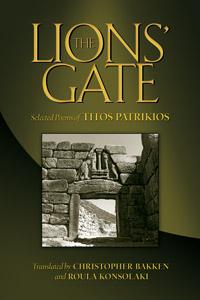 |
|
|
The Lions' Gate: Selected Poems of Titos Patrikios |
|
 |
Title: The Lions' Gate: Selected Poems of Titos Patrikios Author: Titos Patrikios Translators: Christopher Bakken, Roula Konsolaki Publisher: Truman State University Press Date of Publication: December 2006 Language:English ISBN: 1931112649 Price: $24.95 Description: hardcover Availability Truman State University Press: [https://tsup.truman.edu/store/ViewBook.aspx?Book=832]; major online distributors and booksellers like Barnes and Noble and Amazon.com. |
Book Release The Lions' Gate introduces a crucial voice in world poetry to readers in English. Titos Patrikios is a poet of witness and engagement. A member of the intellectual left in post-war Greece, he survived imprisonment, hard labor, censorship, and exile. He narrowly escaped death by firing squad, and once had to bury his poems to keep them from discovery by the authorities. Patrikios endured years away from his home country, Greece, and was displaced from his family and literary community. His style bears the marks of that pressure and of his persistent need to pursue what might suffice in spite of such predicaments. At times reminiscent of Hikmet, Neruda, and Milosz, Patrikios's poems sound a note of defiant celebration. This poet's ethos is utterly humanistic and his impulses are toward praise as often as they are toward protest. Reviewers Titos Patrikios belongs in the twentieth-century pantheon with Yannis Ritsos, Nazim Hikmet, and Pablo Neruda. He writes out of a deep and anguished humanity; his work is earthy, unremitting, noble. The Lion’s Gate brings a significant Greek poet into English with exemplary care and clarity.—Edward Hirsch These fine translations, rendering a selection from some fifteen volumes of Titos Patrikios’s work over a period of 54 years, demonstrate why his voice has come to be recognized as one of the most compelling in Greek poetry since the Second World War. Heir to Seferis and Ritsos, he shares with these precursors the capacity to raise his personal vision and sensibility to a level that illuminates the tragic climate of his country in harsh years of civil war, dictatorship, exile, and disillusionment. During the course of his prolific career, the poet’s imagery blossoms from its surrealist roots into a brighter, simpler mode, an access to wisdom and human understanding that is without sentimentality but that offers the prospect of a certain resolution however contrary the times. That this development remains clear in this English version of Patrikios’s work is testimony to the persistent care and high quality of these translations.—Edmund Keeley The elegant translators have given us a perfectly fluent and flawless version of the poems of Titos Patrikios, a poet who is a mirror of five decades of Greek history. I am drawn most to the meticulous snapshot poems that catch a moment of love, politics, Greek life. Whitman's poignantly acute Civil War poems come to mind. Here is an amazing example of the poet and his translators: Patrikios is a sun and star figure in modern Greek poetry.—Willis Barnstone Utterly free of sentimentality or self-pity, Titos Patrikios’s poems have an edge honed by many difficult years of exile. How remarkable, then, that the predominant impression left by The Lions’ Gate is of joy—a joy no less radiant for being hard-won.
Bakken and Konsolaki’s translations, poised and clear, do justice to the economy and force of the of the original Greek. This is a beautiful and heartening collection.—Rachel Hadas |
|
| About the Author Titos Patrikios was born in Athens in 1928. He studied Law in the University of Athens and later sociology and philosophy in Paris, at the Ecole Pratique des Hautes Etudes and at the Sorbonne. He was active in the resistance movement against the German Occupation, but during the years of military dictatorship following the Greek Civil War he was "displaced" within the borders of his own country (to detention camps on the islands of Makronissos and Ai-Stratis), and later exiled outright to Paris and Rome, once from 1959-1964 and again from 1967-1975. After he received Greece's National Prize for Literature, Patrikios' numerous books were assembled by Kedros Publishers into a three-volume Collected Poems, and several new volumes have followed.[Information furnished by translator at the webpage [http://webpub.allegheny.edu/employee/c/cbakken/patrikios%20translations/patrikios%20page.html] |
|
| About the Translators Christopher Bakken Christopher Bakken, co-translator, is the author of two books of poems: After Greece (which has been translated into Greek) and Goat Funeral. His poems, essays, and translations have appeared widely; After Greece won the prestigious national T.S. Eliot Prize in Poetry in 2001. Bakken teachers at Allegheny College in Pennsylvania. Roula Konsolaki Roula Konsolaki, co-translator, teaches in Chania on the island of Crete. Her translations from English, French, and Greek texts have been published widely |
|
|
(Posting date 08 Deceember 2006. Publishers' release, critics' remarks, and cover image reproduced with permission of publisher, Truman State University Press.) HCS readers may wish to read releases or announcements of other books in our Books section or in our extensive, permanent archives at the URL http://www.helleniccomserve.com/archivebookreviewsandreleases.html. |
|
|
|
|
2000 © Hellenic Communication Service, L.L.C. All Rights Reserved.
http://www.HellenicComServe.com |
|
